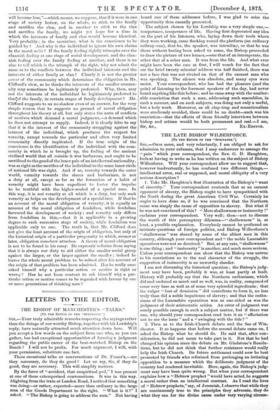LETTERS TO THE EDITOR.
THE BISHOP OF MANCHESTER'S "TALKS."
[TO THE EDITOR OF THE "SPECTATOR
Sm,—Your truly admirable remarks respecting the sayings rather than the doings of our worthy Bishop, together with his Lordship's reply, have naturally attracted much attention down here. Will you accept a few words on the subject from one who, as you can gather, has had exceptional opportunities of forming a judgment regarding the public career of the best-watched Bishop on the Bench ? I will not be prolix. For much argument, I will, with your permission, substitute one fact.
These occasional talks or conversations of Dr. Fraser's,—are they necessary, do they do good ? Let us say, Sir, if they do good, they are necessary. This will simplify matters.
By the force of " accident, that unspiritual god," I was present at one of these extemporised conversations. It was in this way. Alighting from the train at London Road, I noticed that something was doing—or rather, expected—more than ordinary in the large area of the Goods Department to the right. " What is it?" I asked. "The Bishop is going to address the men." Not having
heard one of these addresses before, I was glad to seize the opportunity thus casually presented.
The subject chosen by his Lordship was a•very simple one,— temperance, temperance of life. Having first deprecated any idea on the part of his listeners, who, laying down their tools where they were working, came flocking round the platform (an ordinary railway-van), that he, the speaker, was intruding, or that he was there without having been asked to come, the Bishop proceeded to draw the picture of two homes,—one that of an intemperate, the other that of a sober man. It was from the life. And what ever might have been the case at first, I will vouch for the fact that ere the brief twenty minutes' address was half finished, there was not a face that was not riveted on that of the earnest man who was speaking. The silence was absolute, and many eyes were moist. Your correspondent, who has had the pleasure (and the pain) of listening to the foremost speakers of the day, had never heard anything like this before; and he came away with the unalter- able conviction that such a man, addressing such assemblies, in such a manner, and on such subjects, was doing not only a useful, but a holy work. Moreover, as all clap-trap and sensationalism were studiously avoided, there could be no doubt—such was his conviction—that the effects of these friendly interviews between bishop and artisan would be both permanent and real.—I am,






































 Previous page
Previous page